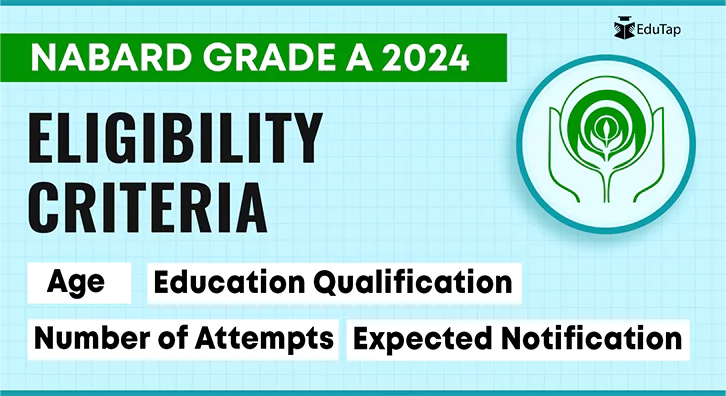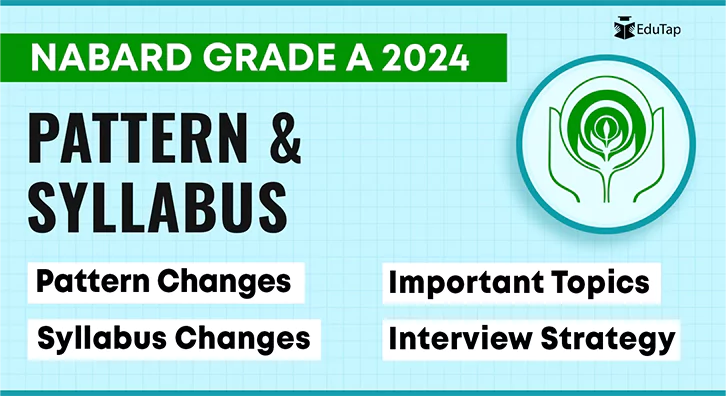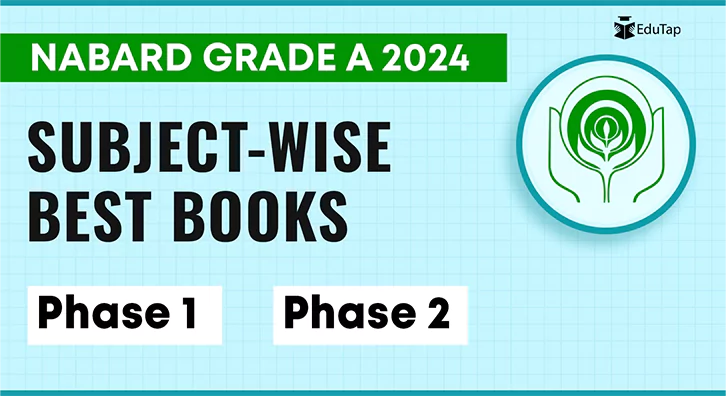NABARD is India’s apex development bank. It was created in 1982 through a parliamentary Act to support just and sustainable rural and agricultural development.
Since then, NABARD has changed lives in Indian villages through agri-finance, infrastructure development, banking technology, promotion of microfinance, and rural entrepreneurship through SHGs & JLGs, and more. As an Assistant Manager at NABARD, your primary task is to help improve the lives of the agrarian communities of India.
By ensuring that the financial aid and scheme from NABARD reach the right people, a NABARD Grade A Officer can dramatically improve their quality of life. Helping farming communities for stable cooperatives, leveraging the benefits the government has designed for them, or just imparting the right technical knowledge, working at NABARD is a step towards nation-building.
Work-Life Balance
Assistant Managers typically have administrative work with a 9 to 5 schedule. However, it is hardly lifeless and dull work; it is dynamic and very fulfilling as one gets to add value to the largest employment sector of this nation. In this organization’s managerial hierarchy, the Assistant Manager holds the lowest rank. However, this does not diminish the status or importance of the work done by them. On a day-to-day basis, as a NABARD Grade A Officer, you get to execute various state and central government programmes related to Agriculture and Rural Development. Furthermore, you get to work with liaisons from banking institutes to make the lives of our farmers easier.
The organisation doesn’t discriminate between specialists and generalists. However, specialists may be assigned departments that may be related to their specific educational qualifications and some ‘additional-special’ responsibilities. NABARD officers are expected to be voracious readers who can keep up with every minute change in the agricultural sector of the country and innovations around the world. Although a large chunk of the work is of a clerical nature, including responding to emails and drafting official documents, limited opportunities to acquire field experience are a highlight of the job. Officers serve their 2 years probation period in a city away from their home state. NABARD Grade A job locations are urban, with assistant managers posted across offices in tier-1 and tier-2 cities, generally confined to state capitals. Thus, this job is an excellent opportunity for anyone who would like to work for the rural population of the country, while still enjoying the perks of city life. In most cases, an officer must spend 5-6 years at one posting. After four years, they are eligible for transfer and must choose between zones (South, East, West, North, North East, Andaman, and Jammu and Kashmir and then select a state within that zone. The transfer is determined according to the availability of vacancies. One simply cannot devote his/her entire career to one centre (unless you work in the law department). The officer’s tenure may vary depending on his or her rank, experience, and the organization’s special requirements. Transfer decisions are heavily influenced by performance. Officers may also be transferred to acquire exposure to different functions, industries, or areas, allowing them to gain diverse experiences and improve their skills and knowledge. On achieving Grade D, i.e., Deputy General Manager, there is no fixed tenure, and you can be transferred to any other office or city.Postings and Transfers
NABARD Grade A eligibility criteria is divided into two major categories:
- Age
- Educational Qualification
NABARD Grade A: Age Limit
It is essential to be aware of the age limit before applying for the NABARD Grade A exam. The age limit is subcategorized into two limits; upper and lower. The details of the same are given below:-
| Minimum Age Limit | Maximum Age Limit |
| 21 Years | 30 Years |
NABARD Grade A: Age Limit Relaxation
There is some specific relaxation w.r.t the upper age limit for certain categories. However, there is no age relaxation for the lower limit.
| NABARD Grade A Eligibility – Age Limit Relaxation | ||
| SNo. | Category | Age Relaxation |
| 1 | OBC | 3 years |
| 2 | SC/ST | 5 years |
| 3 | Ex-servicemen (including Emergency Commissioned Officers/Short Service Commissioned Officers) provided that the applicants have rendered at least five years of continuous Military Service and have been released on completion of assignment (including those whose assignment is due to be completed within one year) otherwise than by way of dismissal or discharge on account of misconduct or inefficiency or on account of physical disability or have been released on account of physical disability attributable to Military Service or on invalidation | 5 years |
| 4 | Emergency Commissioned Officers/Short Service Commissioned Officers who have completed their initial period of assignment of five years of Military Service but whose assignment has been extended beyond five years and in whose case, on selection, the Ministry of Defence issues certificates that they would be released within 03 months from the date of receipt of an offer of appointment | 5 years |
| 5 | Children/family members of victims died in the1984 riots | 5 years |
| 6 | Persons with Disabilities (PWBD) | 10 years for General 13 years for OBC 15 years for SC/ST |
Important Note: No cumulative age relaxation will be available to any applicant, save as provided above.
In addition to adhering to the age limit, meeting the NABARD Grade A educational qualification is of equal significance. In the following table, we have explained the educational qualification for general and specialized disciplines. OR Post Graduate degree, MBA/PGDM with a minimum of 55% marks (SC/ST/PWBD applicants – 50%) in aggregate OR CA/ CS/ICWA OR Ph.D from Institutions recognized by GOI/UGC. Important Note: Some universities or institutions use Aggregate Grade Points (e.g., CGPA/OGPA/CPI) instead of awarding specific class or percentage marks. In this case, if the university/institute has established criteria for converting Aggregate Grade Points into class and/or percentage marks, those criteria will be accepted and followed. However, if the university/institute does not provide specific criteria for the conversion of Aggregate Grade Points into class and/or percentage marks, the following procedure will be implemented: DivisionNABARD Grade A: Educational Qualifications
NABARD Grade A Eligibility: General Posts
SNo.
Post
Educational Qualifications
1
General
Bachelor’s Degree in any subject from any recognized University/Institution with a minimum of 60% marks (SC/ST/PWBD applicants – 55%) in aggregate
Equivalent CGPA/ OGPA/ CPI or similar terminologies allotted on a 10-point scale
Class/
Aggregate % of Marks
6.75
First
60%
6.25
Second
55%
5.75
Second
50%
5.25
Second
45%
The NABARD Grade A examination consists of three phases:
- Phase I (Prelims)
- Phase II (Mains)
- Interview
Candidates must qualify for all three phases with a required cut-off. The exam pattern for each stage of the NABARD Grade A exam is given below:
NABARD Grade A Phase l Exam Pattern
The first phase of the NABARD Grade A exam is the Phase l (prelims). It contains 200 multiple-type questions and two hours are allotted to the candidates to attempt the exam. It is of a qualifying nature and marks obtained in this exam will not be counted in the final selection.
Here are the details of the NABARD Grade A prelims exam pattern:
| NABARD Grade A Prelims Exam Pattern | |||||
| S No. | Name of the Test | No. of Qs. | Max Marks | Version | Time |
| 1 | Test of Reasoning | 20 | 20 | Bilingual – Hindi and English except for the test of English language | Composite time of 120 Minutes for all the tests together |
| 2 | English Language | 30 | 30 | ||
| 3 | Computer Knowledge | 20 | 20 | ||
| 4 | Quantitative Aptitude | 20 | 20 | ||
| 5 | Decision Making | 10 | 10 | ||
| 6 | General Awareness | 20 | 20 | ||
| 7 | Economic and Social Issues (with focus on Rural India) | 40 | 40 | ||
| 8 | Agriculture & Rural Development with Emphasis on Rural India | 40 | 40 | ||
| Total | 200 | 200 | |||
These 8 subjects are categorised into merit and non-merit (qualifying) sections: Important Note: There is no sectional timing in Phase l. The second phase of the NABARD Grade A exam is the mains exam, which has both descriptive and objective online tests. OR
NABARD Grade A Phase ll Exam Pattern
NABARD Grade A Mains Exam Pattern (Generalist Posts)
Paper
Grade A
Type of Paper
No. of Question
Marks
Duration
Remarks
Paper I
General English
Online Descriptive
3
100
90 Minutes
Descriptive Answers are to be typed using a keyboard
Paper II
Economic and Social Issues
Stream Specific PaperObjective
30
50
30 Minutes
Descriptive Type
6 questions will be asked, of which candidates will be required to attempt 4 questions [2 of 15 marks each (with difficulty level) and 2 of 10 marks each]
50
90 Minutes
Descriptive Answers are to be typed using a keyboard either in English or Hindi (Remington and Inscript keyboards)
The syllabus of the NABARD Grade A exam is divided into two parts; Phase I and Phase II. Here are the details:-
NABARD Grade A Phase l Exam Syllabus
The phase l NABARD Grade A exam consists of the following subjects:
- Reasoning
- Quantitative Aptitude
- English Language
- Computer Knowledge
- Decision Making
- General Awareness
- Economic and Social Issues
- Agriculture and Rural Development
Reasoning
Based on past year exam analysis of NABARD Grade A, following topics are most frequently asked from reasoning section:
| Reasoning Topics | ||
| Alphanumeric series | Coding and Decoding | Syllogism |
| Direction Sense | Inequality | Ranking and Order |
| Questions based on Statements | Questions based on Data Sufficiency | Puzzles and Sitting Arrangement |
| Blood Relation | Input-Output | |
Based on past year exam analysis of NABARD Grade A, following topics are most frequently asked from Quantitative Aptitude section: Based on past year exam analysis of NABARD Grade A, following topics are most frequently asked from English section: Improvement One-word Substitution, Phrasal verbs) Based on past year exam analysis of NABARD Grade A, following topics are most frequently asked from general awareness section: Based on past year exam analysis of NABARD Grade A, following topics are most frequently asked from decision making section: Based on past year exam analysis of NABARD Grade A, following topics are most frequently asked from computer knowledge section: Based on past year exam analysis of NABARD Grade A, following topics are most frequently asked from Economic and Social issues section: Based on past year exam analysis of NABARD Grade A, following topics are most frequently asked from agriculture & rural development section: The NABARD Grade A phase ll (mains) exam includes 2 papers of General English, Economic and Social Issues/Agriculture and Rural Development. It consists of both online objective and online descriptive tests. The subject-wise syllabus of the NABARD Grade A Phase II paper is listed below:- Paper 1: English Writing Paper 2: Economic and Social Issues (ESI) and Agriculture and Rural Development (ARD) The syllabus of Paper II is the same as the syllabus of ESI & ARD in Phase 1.Quantitative Aptitude
Quantitative Aptitude Topics
Ratio and Proportion
Percentage
Profit and Loss
Simple and Compound Interest
Questions on Average and Age
Questions on Series and Quadratic equation
Mathematical Inequalities
Time and Work
Pipes and Cistern
Time and Distance
Mixture and Alligation
Number series
Data interpretation
Simplification/Approximation
Quantity comparisons
English
English Topics
Questions on Reading Comprehension
Sentence Rearrangement
Cloze Test
Parajumbles
Double fillers
Error Detection and Sentence
Vocabulary (Synonyms, Antonyms,
General Awareness (GA)
General Awareness (GA) Topics
Current affairs of the preceding 6 months from the date of examination.
National News: MoUs, summits and major events related to India.
International: Summits, Conferences held abroad.
Defence: Military exercises, drills and major updates related to the defence sector of India.
Days in News: Major events or days, along with its date, and theme.
Persons in News: Obituaries, appointments, retirements.
Environment
Books and Authors
Awards and Honours
Science, Technology and Space
Banking, Economy and Schemes
Sports: Major tournaments and its winners.
Static GA: Chief Ministers and Cabinet Ministers, National Parks and Sanctuaries, Organisations’ Headquarters, Banks’ Headquarters and Taglines, Power Plants in India, Indian Dance Forms, Countries’ Capitals and their Currencies.
Decision Making
Decision Making Topics
Basics of Decision Making
Types of Decision Making
Decision Making Models
Decision Making Approaches
Factors affecting Decision Making
Types of Problems Decision Making
Computer Knowledge
Computer Knowledge Topics
Computer Awareness
Hardware and Memory
Software and Operating Systems
MS Office
Database Management System
Internet and Computer Security
History and Computer & Generations
Shortcuts
Economic and Social Issues
Economic and Social Issues Topics
Nature of Indian Economy
Inflation
Population Trends
Agriculture
Industry
Social Structure in India
Education
Social Justice
Social Movements
Globalization of Economy
Human Development
Indian Political Systems
Current Economic & Social Issues
Rural banking and financial institutions in India
Poverty Alleviation and Employment Generation in India
Agriculture & Rural Development
Agriculture & Rural Development Topics
Agriculture
Agronomy
Classification of Field Crops
Cropping Systems
Seed Productions
Meteorology
Precision Farming
Soil and Water Conservation
Water Resource
Farm and Agri Engineering
Plantation & Horticulture
Animal Husbandry
Fisheries
Agriculture Extensions
Forestry
Ecology and Climate Change
Rural Development
Rural population in India
Panchayati Raj Institutions
Present Scenario of Indian Agriculture and Allied Activities
NABARD Grade A Phase ll Exam Syllabus
Following are the year-wise cut-offs for Phase 1 and 2 of the Grade A examination.
NABARD Grade A 2022 Prelims
Overall Cut-Off (out of 100)
| Discipline | UR | EWS | OBC | SC | ST |
| Grade A (General) | 41.75 | 29.25 | 37.75 | 33.25 | 30.75 |
Sectional Cut-Off
| Category | Quant | Reasoning | English | Computer Knowledge | Decision Making | GA | ESI | ARD |
| UR/EWS | 3.00 | 3.75 | 12.50 | 5.50 | 1.50 | 3.25 | 2.25 | 6.75 |
| SC/ST/OBC/EWS | 1.00 | 1.50 | 9.25 | 4.00 | 1.00 | 1.75 | 1.00 | 3.25 |
NABARD Grade A 2022 Mains
Overall Cut-Off
| Discipline | UR | EWS | OBC | SC | ST |
| Grade A (General) | 130.50 | 121.50 | 124.50 | 120.00 | 119.25 |
Sectional Cut-Off
| Category | UR / EWS | SC/ST/OBC/PWD |
| Paper 1 – Descriptive English | 49.00 | 46.25 |
| Paper 2 – ESI & ARD | Objective – 19.00 | Objective – 15.75 |
| Descriptive – 23.75 | Descriptive – 20.25 |
NABARD Grade A 2021 Prelims
Overall Cut-Off (out of 100)
| Discipline | UR | EWS | OBC | SC | ST |
| Grade A (General) | 53.50 | 32.75 | 45.75 | 44.00 | 41.50 |
Sectional Cut-Off
| Category | Quant | Reasoning | English | Computer Knowledge | Decision Making | GA | ESI | ARD |
| UR/EWS | 5.00 | 3.75 | 11.25 | 3.25 | 1.25 | 3.00 | 4.50 | 6.50 |
| SC/ST/OBC/EWS | 2.50 | 1.25 | 7.50 | 2.00 | 1.00 | 1.75 | 1.00 | 3.00 |
NABARD Grade A 2021 Mains
Overall Cut-Off
| Discipline | UR | EWS | OBC | SC | ST |
| Grade A (General) | 118.42 | 115.50 | 114.08 | 109.67 | 109.83 |
Sectional Cut-Off
| Category | UR / EWS | SC/ST/OBC/PWD |
| Paper 1 – Descriptive English | 50.25 | 48.50 |
| Paper 2 – ESI & ARD | Objective – 18.75 | Objective – 16.00 |
| Descriptive – 21.25 | Descriptive – 19.00 |
NABARD Grade A 2020 Prelims
Overall Cut-Off
Discipline
UR
EWS
OBC
SC
ST
Grade A (General)
118.50
95.75
104.00
98.50
92.00
Sectional Cut-Off
Category
Quant
Reasoning
English
Computer Knowledge
GA
ESI
ARD
UR/EWS
1.25
2.25
8.50
3.25
1.75
2.00
1.00
SC/ST/OBC/EWS
1.00
1.00
3.50
1.50
1.00
1.00
1.00
NABARD Grade A 2020 Mains
Overall Cut-Off
Discipline
UR
EWS
OBC
SC
ST
Grade A (General)
126.00
117.00
117.00
116.75
115.25
Sectional Cut-Off
Category
UR / EWS
SC/ST/OBC/PWD
Paper 1 – Descriptive English
49.00
43.00
Paper 2 – ESI & ARD
46.00
41.75
NABARD Grade A 2019 Prelims
Overall Cut-Off
Discipline
UR
EWS
OBC
SC
ST
Grade A (General)
129.00
111.00
117.00
109.50
100.50
Sectional Cut-Off
Category
Quant
Reasoning
English
Computer Knowledge
GA
ESI
ARD
UR/EWS
4.25
3.00
10.75
4.00
2.50
3.00
3.25
SC/ST/OBC/EWS
1.25
1.00
5.75
2.50
1.00
1.00
1.00
NABARD Grade A 2019 Mains
Overall Cut-Off
Discipline
UR
EWS
OBC
SC
ST
Grade A (General)
127.50
118.50
120.75
115.50
111.75
Sectional Cut-Off
Category
UR / EWS
SC/ST/OBC/PWD
Paper 1 – Descriptive English
58.00
56.00
Paper 2 – ESI & ARD
45.50
40.75
You can refer to this preparation strategy for the NABARD Grade A phase 1 exam.
The following pointers will help you target each subject.
- Economic and Social Issues (ESI)
- Focus on ESI Current Affairs (Schemes, Reports, Current Developments, etc.)
- Practice writing 3 answers, from both static and current, as this will help you revise as well.
- Do not skip the ESI static syllabus.
- The 7 chapters to target, in the beginning, would be the Measurement of Growth, Opening up of the Indian Economy and Balance of Payments, Inflation, Monetary Policy, Fiscal Policy, Employment generation and Poverty alleviation, and Rural Banking and Financial Institutions.
- Agriculture and Rural Development (ARD)
- Study important static chapters comprehensively.
- Practice writing any 3 answers based on the chapters you are covering; this will help you revise as well.
- Stick to the syllabus.
- The 7 chapters to target, in the beginning, would be Agronomy, Farming System, Soil and Water Conservation, Plantation and Horticultural Crop, Animal Husbandry and Poultry, Fisheries, and Forestry.
- General Awareness
- Focus on the latest 3 months of current events and news.
- Undertake the Question to Magazine approach. Here, you first take a quiz and then later refer to the source for a better understanding of the questions, format, and syllabus.
- Based on our PYQ analysis, the weightage of current has generally been higher than static in GA.
- Quantitative Aptitude + Reasoning + English
- Focus on Scoring/Important Topics and later target the rest of the topics.
- Practice questions based on the covered important topics.
- Invest time in English preparation. Do not assume that you will be able to clear the same without any practice.
- Computer Knowledge + Decision Making
- Prioritise question practice.
- Study the basics of the syllabus topics and attempt mock tests for the same.
- Try to read through Cases of Decision Making as many as possible.
Lastly, incorporate consistent revision and mock tests during your study plan. Now let’s look at a subject wise strategy for Phase 2. The topics for descriptive English are not explicitly defined in the official notification of NABARD Grade A. Based on an analysis of previous year’s questions, we can conclude that, Let’s quickly look at one example each of Essay and Letter Writing from the Question Paper of 2022 for a better understanding. The strategy for Descriptive English is to hone your ability to write clear, concise, and informative essays, letters, and reports. It is about how well candidates are able to express their thoughts and ideas. Additionally, consistent practice on the keyboard will help you increase your typing speed as well.Descriptive English Strategy
Essay Writing: 2022 exam
Letter Writing: 2022 exam
Free Resources
SELECT YOUR ONLINE MENTORSHIP COURSE
Strengthen your exam preparation with true MENTORSHIP and choose the course as per your learning needs.
OUR SUPER MENTORS
Meet our extraordinary teachers who are synonymous with expertise in their subjects. They are highly acclaimed for adding immense value to students’ preparation. Our students owe their success to them!

- B.A (Maths), M.Sc (Statistics)
- Exceptional Teaching Skills
- The Ultimate ‘Quant Guru’

- B.Sc in PCM
- Promotes Conceptual Understanding
- Introduces Different Approaches

- M.A English
- The Ultimate English Mentor
- Our ‘Shashi Tharoor’

- Bachelor of Commerce
- Simplifies Current Affairs
- Guided Aspiring Learners

- B.Tech (Mechanical)
- Former RBI Grade B aspirant
- Guided Aspiring Learners

- B.Sc Agriculture
- ‘Wikipedia’ of ARD
- Guided Aspiring Learners

- M.Sc Allied Agriculture
- First Builds Fundamentals
- Guided Aspiring Learners

- M.Sc Agriculture
- Your ‘Google’ for ARD
- Guided Aspiring Learners

- Integrated M.Sc in Economics
- Gold Medalist
- Teaches from scratch

- BMS (Finance)
- DBF (JAIIB) Certified
- Guided Aspiring Learners
STUDENT TESTIMONIALS
Listen to our students share their learning experiences as part of the EduTap family!




FREE RESOURCES LIBRARY
Dive deep into our free knowledge library and access Video Lectures, Previous Year Questions, Mock Tests, E-Books, Current Affairs, and more.
Memory-based year-wise compiled previous year question papers of all exams.
Weekly current affairs compilations important covering newspapers and websites.
Online lectures by our expert faculty to build a strong foundation of subjects.
Downloadable PDFs covering important topics in a crisp and easy to digest format.
Chapter-wise, sectional and full-length tests to assess your actual preparation level.
RECOMMENDED ARTICLES
Stay up-to-date with the latest articles written after thorough research of NABARD Grade A exam and excel in your exam preparation.
Frequently Asked Questions (FAQs)
The NABARD Grade A Exam is generally held once a year.
To be eligible for the NABARD Grade A exam, the candidate should be a citizen of India. The candidate should be between 21 to 30 years of age as of the cut-off date of the notification for the year applied for. They should have a bachelor’s degree in a specific subject depending on the applied post.
The basic concepts and topics mostly remain the same. However, there might be small changes subject to the organisation. Checking the latest official announcement is important to ensure you have the accurate syllabus for the year you are appearing for.
The NABARD Grade A Phase 1 prelims exam consists of a total of 200 questions of 1 mark each.
For the preparation of NABARD Grade A 2024, EduTap offers a 15-day free starter pack for beginners. It’s a comprehensive resource created by experienced teachers to help you prepare effectively. This course includes videos on different subjects, study notes, practice tests, and more. It also covers detailed content for ESI and ARD in line with the latest pattern.
Based on our expert analysis of the trends of the last 3 years, the notification is expected at the end of August or the beginning of September 2024.
Here are some tips for preparing for the NABARD Grade A Phase 2 exam:
- Start early and develop a comprehensive study plan.
- Focus on the most important topics, but don’t neglect the other topics altogether.
- Practice answering different types of questions.
- Take mock exams to get a feel for the exam format and to identify your areas of weakness.
- Stay positive and confident.
EXPLORE OTHER EXAMS
Discover more about other related exams of the Regulatory Bodies Segment.

IFSCA Grade A officer dives deep into the regulatory landscape of financial services, encompassing banking, insurance, securities markets, and more.

Work as an Assistant Manager with Securities and Exchange Board of India

Work as an Assistant Manager with Securities and Exchange Board of India















